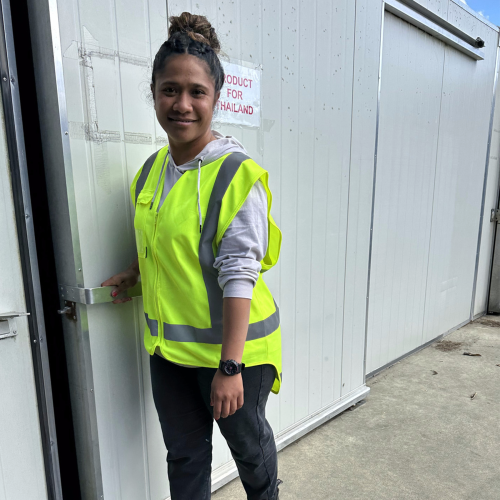Training opportunities can help address skills shortage
13 April 2023
Encouraging and training workers to gain qualifications and progress in the horticultural industry is a key way to address the skills shortage affecting the industry.
Attracting enough staff during our busy harvesting season remains a constant challenge, says Matakana Berry Co. owner, Lynda Ashby.
Based at Omaha Flats north of Auckland, Matakana Berry Co. is one of New Zealand’s commercial strawberry producers also growing blueberries. It has been growing berry fruit for more than 40 years and supplies fruit to New Zealand’s large supermarket chains and the export market.
 The company is very proud of a recent Primary ITO New Zealand Certificate in Post-Harvest graduate Seneti Makasini, who started out as a packhouse worker and through her years of knowledge and experience was offered a position in the company as Strawberry Product Inspection Manager.
The company is very proud of a recent Primary ITO New Zealand Certificate in Post-Harvest graduate Seneti Makasini, who started out as a packhouse worker and through her years of knowledge and experience was offered a position in the company as Strawberry Product Inspection Manager.
Lynda says the horticulture industry needs a wide range of skills across all roles from harvesting to more specialised positions and offering staff the opportunity to gain knowledge and learn on the job is one way to address that.
The Covid-19 pandemic opened up the opportunity for Seneti to train towards the Level 4 programme.
Seneti was an experienced Recognised Seasonal Employer scheme worker who for 10 years came from Tonga to work the summer harvest season at Matakana Berry Co.
When the Covid-19 pandemic struck in 2020 Seneti was on a visitor’s visa to visit her family in New Zealand and was unable to leave the country, which opened up an opportunity for her.
“We realised we needed her in our business because of the staff shortages with Covid and experience was really key around that time,” says Lynda.
Matakana Berry Co. was successful in its application for a work visa for Seneti and she began a full-time role, later also gaining New Zealand residency.
Lynda says Seneti was gaining a deeper understanding of the industry through her new role and her talent for progression was noticeable.
Qualification recognises and builds skills
“Over the years she had gained more responsibility and we could see the potential. We felt completing the Primary ITO programme would recognise her knowledge and experience to give her a qualification and build her skills and confidence.”
Seneti had earlier completed the Level 2 Horticulture programme. “We said ‘you are now understanding all the things we do out of the season when you are usually not here, why don’t you progress your learning?’”
With English as her second language, Seneti was cautious about taking on higher levels of the programme but says the support of Lynda and her Primary ITO Training Adviser Martina Balasova helped her immensely.
Seneti completed Level 4 in 2023. Lynda says Martina’s support helped her to understand what was required. “Her role was so crucial in giving Seneti a little bit of support from the outside and it really pushed her through to the end.”
Martina says Seneti worked hard to achieve her goals. With little time available during the busy harvest season from August and December, Seneti focused on completing much of the work in January and February, with Lynda also setting aside time to go through the tasks and verify the work.
Starting out as a fruit packer, Seneti advanced to quality control tasks and then assisted with supervising and training the packhouse team.
Seneti enjoys helping others and reached out to help fellow RSE workers who were having difficulty sending their money home by bank transfer. Seneti found a solution and became part of the Tonga Development Bank pilot for the process, including featuring in the bank’s marketing.
As Seneti progressed through Level 4, her confidence grew as she understood how much knowledge and experience she already had in her new role, says Lynda.
Qualification life-changing
Seneti says the opportunity to both live and work permanently in New Zealand has been life changing and she is thankful for the support she has received from Matakana Berry Co. and Primary ITO.
It’s a big change from her previous life of travelling to New Zealand each summer for work, and returning to Tonga for the winter to await the next harvest season and she is happy that she can now spend time with her family who had settled in New Zealand before her.
Matakana Berry Co. is very proud of Seneti’s achievements. “She has done amazingly and extended her knowledge beyond belief.”
Lynda says she encourages other growers to consider giving staff the opportunity to do the post-harvest programmes. The company continues to encourage team members to take up the study and hopes more staff can progress this way in future.
To learn more about our post-harvest programmes, click here.
Contact your local horticulture production Training Adviser on 0800 20 80 20 or email info@primaryito.ac.nz
